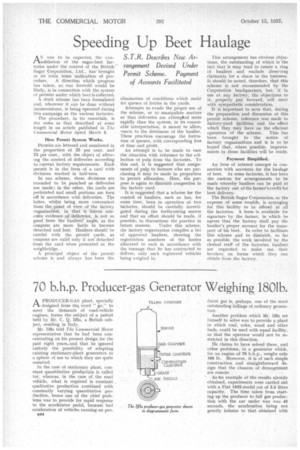Speeding Up Beet Haulage
Page 62

If you've noticed an error in this article please click here to report it so we can fix it.
S.T.R. Describes New Arrangement Devised Under Permit Scheme. Payment of Accounts Facilitated
AS was to be expected, . the consolidation of the sugar-beet factories under the control of the British"' Sugar Corporation, Ltd., has brought in its train some unification of pro cedure. A direction which progress has taken, as was foretold would be likely, is in connection with the system of permits under which beet is collected.
A draft scheme has been formulated and, wherever it can be done without Imconvenience, is being operated during this campaign at the various factories.
The procedure, in its essentials, is the same as that described at some length in an article published in The Commercial Motor dated March 5.
How Permit System Works.
Permits are lettered and numbered in the proportion of 25 per cent. and 75 per cent., with the object of allowing the control of deliveries according to current factory requirements. Each permit is in the form of a card with divisions marked in half-tons.
In one scheme, these divisions are intended to be punched as deliveries are made; in the other, the cards are perforated and small portions are torn off ha accordance with deliveries. The latter, whilst being more convenient from the point of view of the factory organization, in, that it leaves concrete evidence of ,deliveries, is not so good'. from the hauliers' angle, as the coupons are more liable to become detached and lost. Hauliers should be careful with the permit cards, as coupons are valid only if not detached from the card when presented at the weighbridge.
A principal object of the permit. scheme is and always has been the elimination of conditions which make for queues of lorries in the yards.
Attempts to evade the proper use of the scheme, or to manipulate matters so that deliveries are attemited more rapidly than the system, in its reasonable interpretation, is meant to ,allow, reacts to the detriment of the haulier. These practices encourage the formation of queues, with corresponding loss of time and profit.
An attempt is to be made to ease the situation with reference to the collection of pulp from the factories. To this end, it is suggested that assignments of pulp to farmers who are purchasing it may be made in proportion to permit allocation. Here, the purpose is again to diminish congestion in the factory yard.
It is suggested that a. scheme for the control of hauliers, such as has, for some time, been in operation at two factories. should be carefully investigated during the forthcoming season and that an effort should be made, if possible, to discontinue the practice in future seasons. Under this scheme, the factory organization compiles a list of approved hauliers, showing the registration numbers of the lorries allocated to each in accordance with the tonnage that he has contracted to deliver, only such registered vehicles being weighed in. This arrangement has obvious objections, the outstanding of which is the fact that it may tend to create a ring of hauliers and exclude deserving claimants for a share in the business. It should be noted, therefore, that this scheme is not recommended by the Corporation headquarters, but, if in use at any factory, the objections to it, properly put forward, will meet with sympathetic consideration.
It is important to note that, during the preparation and discussion of this permit scheme, reference was made to factory-yard facilities and the effect which they may have on the efficient operation of the scheme. This has been brought to the notice of factory organizations and it is to be hoped that, where possible, improvements in those facilities will be made.
Payment Simplified.
An item of interest emerges in connection with accounts for the haulage of beet. At some factories, it has been the custom for arrangements to be made whereby hauliers can be paid at the factory out of the farmer's credit for beet delivery.
The British Sugar Corporation, at the expense of some trouble, is arranging for this facility to be offered at all the factories. A form ds available for signature by the farmer, in which he agrees that the factory shall pay the haulier's proper account for the transport of his beet. In order to facilitate this scheme and to diminish, so far as possible, the work involved by the clerical staff of the factories, hauliers are requested to make out their invoices on forms which they can obtain from the factory.




































































































